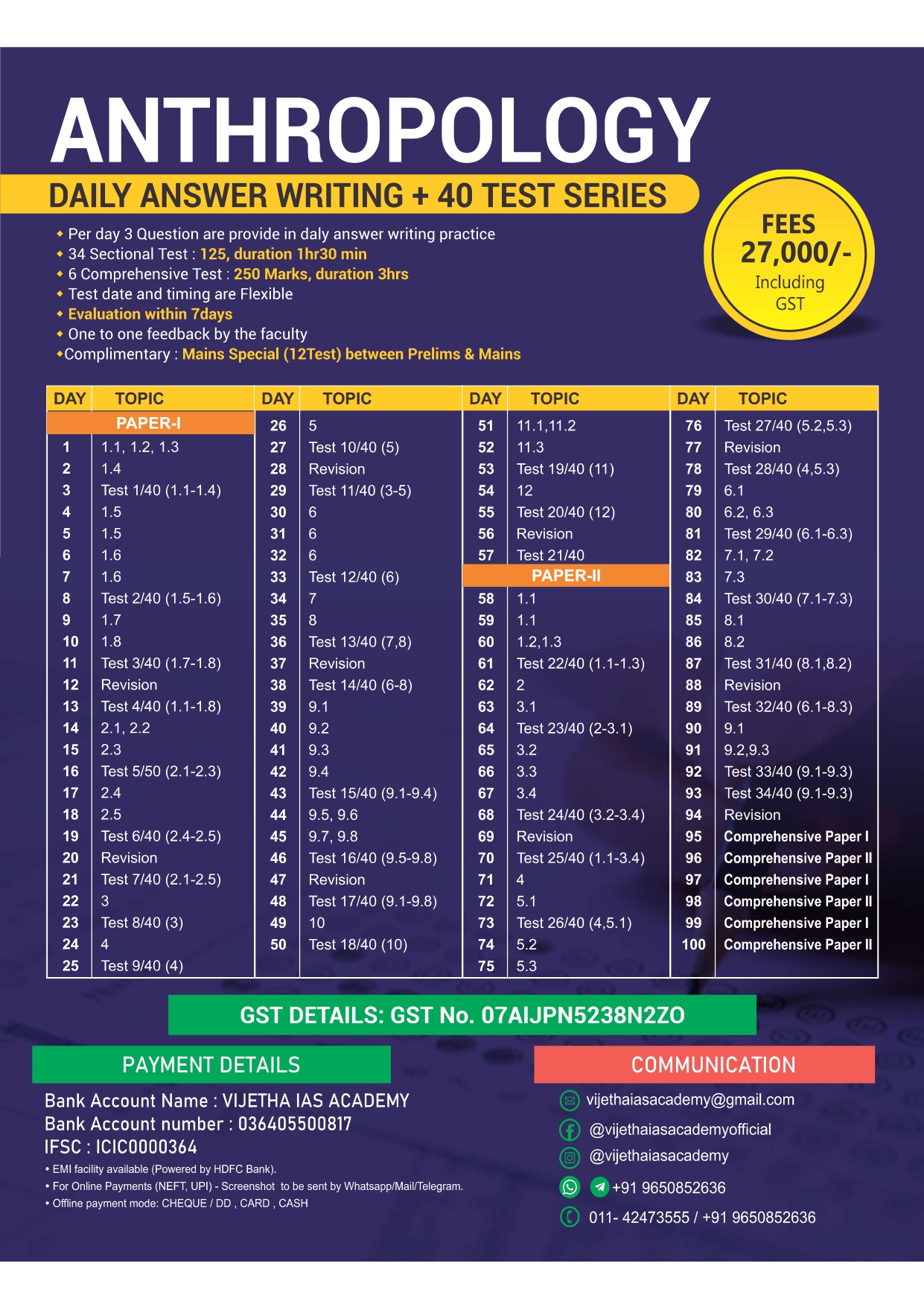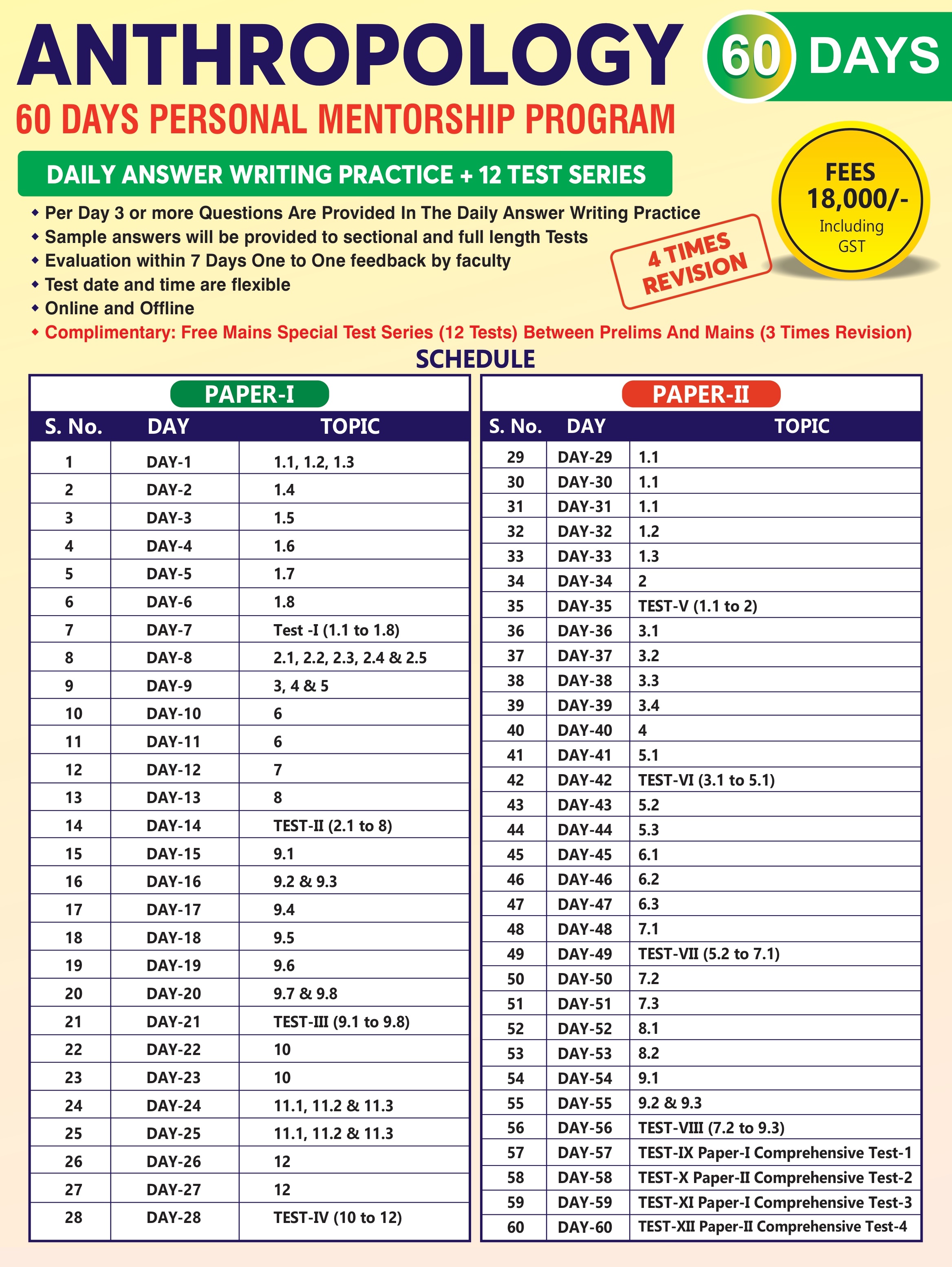
What is a multifactorial trait? Illustrate your answer with suitable human examples.
(15 Marks) Anthropology Optional Paper CSE 2024
Introduction
A multifactorial trait is a characteristic or condition that is influenced by multiple genetic factors as well as environmental factors. Unlike traits that follow Mendelian inheritance patterns, multifactorial traits result from the interaction between multiple genes (polygenic) and non-genetic influences, such as lifestyle or environmental exposures. These traits exhibit a wide range of variation in populations due to the complex interplay of these factors.
Main Body
Characteristics of Multifactorial Traits:
Polygenic Influence:
Multifactorial traits involve the contribution of several genes, each with a small effect, rather than a single gene. The cumulative impact of these genes leads to the observable variation in traits.
Environmental Interaction:
The expression of multifactorial traits is not solely determined by genetics but also depends on environmental factors like diet, lifestyle, or exposure to specific conditions. This interaction makes these traits complex and variable.
Continuous Variation:
Unlike simple Mendelian traits, multifactorial traits often show continuous variation rather than distinct categories. This results in a spectrum of phenotypes, such as height or skin color.
Human Examples of Multifactorial Traits:
Height:
One of the most well-studied multifactorial traits, height is influenced by the combined effects of numerous genes and environmental factors such as nutrition during growth. Studies have identified hundreds of genetic loci associated with height, but environmental factors like malnutrition or illness during childhood can significantly affect an individual’s height potential.
Body Mass Index (BMI) and Obesity:
Obesity is another multifactorial trait, determined by genetic predisposition and environmental factors like diet, physical activity, and lifestyle choices. Certain genetic variants are linked to a higher risk of obesity, but environmental factors play a crucial role in whether these genetic tendencies are expressed.
Cardiovascular Diseases:
Conditions such as hypertension and heart disease are influenced by both genetics and environment. Genetic predisposition can increase the risk, but factors such as diet, exercise, smoking, and stress are significant environmental contributors.
Type 2 Diabetes:
Type 2 diabetes results from the interaction of multiple genes involved in glucose metabolism and insulin regulation, combined with environmental factors like diet, physical inactivity, and obesity. While individuals may inherit a genetic predisposition, lifestyle factors largely determine the development and progression of the disease.
Inheritance Pattern and Risk Prediction:
The inheritance of multifactorial traits does not follow simple Mendelian patterns but shows familial aggregation, meaning that certain traits tend to run in families. However, the risk of inheritance is not absolute due to the influence of environmental factors.
Risk prediction for multifactorial traits is more complex than for single-gene disorders, as it requires consideration of both genetic predisposition and environmental exposures. For instance, a person with a family history of heart disease may lower their risk through lifestyle modifications such as maintaining a healthy diet and exercising regularly.
Conclusion
Multifactorial traits represent a complex interaction between genetics and the environment, leading to wide variation in human characteristics and health conditions. Traits like height, obesity, and cardiovascular diseases illustrate how multiple genes and environmental factors work together to shape human phenotypes. Understanding these traits is critical in fields like genetics, anthropology, and public health, as it allows for better disease risk management and promotes healthier lifestyle choices.
Anthropology Test Series Programme (Online + Offline))
We provide Anthropology Daily Answer Writing a range of programs designed to cater to various stages of UPSC preparation. Whether you're just starting out, have attempted the Mains before, or are getting ready for Mains 2024, we have the right option for you. Allow us to assist you in choosing the course that best fits your needs.
|
Level of Preparation |
Test Series Program |
Test Series Content |
Test Schedule |
|
Self-study of Anthropology Optional |
Anthropology 100 Days Personal Mentorship Program |
Daily answer writing, 34 sectional tests, 6 comprehensive tests, and complementary Mains Special 12 tests (between prelims and mains) |
|
|
Revise whole syllabus through Daily Answer Writing Practice and Tests |
Anthropology DAW Mentorship Program |
Daily Answer Writing Practice and 8 sectional and 4 Full Length tests |
|
|
Revise whole syllabus through Sectional and Full Length Tests |
Anthropology Tier- I T-40 Test Series |
34 Sectionals and 6 Full Length Tests |
|
|
Written Mains earlier and need more practice |
16-Anthropology Tier II Test Series |
10 sectional and 6 Full-Length Tests. |
|
|
Cleared Prelims 2023 and are preparing for Mains 2023 |
Mains Special 12 Tests program |
8 Sectional and 4 Full-Length Tests |
ANTHROPOLOGY MAINS SPECIAL COURSES
Enroll in our Anthropology Mentorship Program today and take the first step towards achieving your UPSC goals!
1) If you are going for Self study of Anthropology Optional and looking for a Comprehensive Program that includes Daily Answer Writing, 34 Sectional tests, 6 Comprehensive tests, and Complementary mains special 12 tests (between prelims and mains), our Anthropology 100 Days Personal Mentorship Program is the perfect choice.
2) If you want to revise Whole Syllabus through Daily Answer Writing Practice and 8 sectional and 4 full length tests, then our Anthropology DAW Mentorship Program is the best fit for you.
3) If you want to revise Whole Syllabus through 34 Sectionals and 6 Full Length Tests then Anthropology Tier- I T-40 Test Series is for you.
4) If you have written Mains earlier and need more practice, then our 16-Anthropology Tier II Test Series is a great option. This test series includes 10 sectional and 6 full-length tests.
5) if you have cleared Prelims 2023 and are preparing for Mains 2023,our Mains Special 12 Tests program is a must-have. This program includes 8 sectional and 4 full-length tests to help you prepare for the big day.
For more information on Vijetha IAS Academy’s Anthropology mentorship programs Deatils : https://vijethaiasacademy.com/anthropology-test-series
Anthropology 100 Days Personal Mentorship Program ( 7 + 3 Times Revision )

Anthropology 60 Days Personal Mentorship Program ( 4 + 3 Times Revision )

For more information: https://vijethaiasacademy.com/anthropology-test-series
Details Of Anthropology Classes Program
Top Anthropology Optional IAS Coaching Center in Delhi Vijetha IAS Academy | Best Anthropology Optional IAS Coaching in Delhi
Fee Structure:
- Tier 1: Rs. 55,150/- (3 Years Validity of Offline/Live Batch)
- Tier 2: Rs. 42,000/-
- Tier 3: Rs. 36,000/-
Batch Size: 50 – 60 Students
UPSC Notes
Anthropology Optional IAS Coaching Notes, IAS Exam Preparation Booklets, IAS optional coaching Notes, UPSC Coaching Notes, Video Lectures, Live Classes with faculty, Chat Facility Available
Teachers Name: N P Kishore Sir
Past Result
- Last Years Result 2023
- 35 Total Selections in CSE 2023
Google Reviews: 4.9 out of 5 stars
Website: Vijetha Anthropology Optional IAS Coaching in Delhi (https://vijethaiasacademy.com)
Faculties of Vijetha IAS Academy
- N P Kishore Sir
Features
- Vijetha IAS Academy offers Online and offline Courses for better preparation of Anthropology Optional Strategy for UPSC in Delhi.
- For better Anthropology optional Exam Preparation, Vijetha IAS Academy Delhi Conducts the Motivational IAS Session.
- Vijetha IAS Academy provides you with the CASE STUDIES on the pattern of the real-time IAS Exam which is helpful for better preparation of the Best Coaching for UPSC Anthropology Optional Optional IAS Examination.
- DAW & WAW – Revision Through Daily & Weekly Answer Writing Practice is offered by Vijetha IAS Academy for better result of the Anthropology Optional IAS examination.
Advantages of joining Vijetha IAS Academy
- Best Faculties for Anthropology Optional IAS Coaching in Delhi
- Best facilities, infrastructure and updated Case Studies Booklets and Notes for better preparation of the Anthropology Optional IAS Examination in Delhi.
- Best result in Past years for Anthropology Optional Strategy for UPSC Examination in Delhi
- Best Rated coaching institute for Anthropology Optional IAS Examination in Delhi.
- Vijetha IAS Academy also provides recorded lectures videos, notes which is very helpful for better preparation of Anthropology Optional IAS Coaching in Delhi
Fees Structure of Vijetha IAS Academy
|
Tier 2 |
Tier 1 |
Tier 3 |
BATCH STARTS FROM |
|
42,000/- |
55,150/- (3 Years Validity Offline/Live Batch) |
36,000/- |
REGISTRATION – START |
Fees Structure of Vijetha IAS Academy
|
Course Name |
Fees Amount |
Course Duration |
|
GS Offline (Pre + Mains+ CSAT) with Essay+Answer Writing |
Rs.99,000 (Including GST) |
400+ Days |
|
GS Online |
Rs.18,999 (Including GST) |
400+ Days |
|
GS Mentorship Programme |
Rs.29,999 (Including GST) |
1 Year |
For more information on our courses, visit our Anthropology Courses page. Explore our Test Series and Online Courses for flexible learning options.
Vijetha IAS Academy
Add. 2nd Floor, 50, Shankar Road, Block 7, Old Rajinder Nagar, Rajinder Nagar, New Delhi, Delhi 110060
MOB. 096508 52636
Open 7 Am : Closes 9 PM
Keywords: multifactorial traits, human genetics, diabetes, height, skin color, anthropology 2024 question paper, Anthropology optional subject question paper 2024, Anthropology optional 2024 question paper, Anthropology Optional Coaching UPSC, Vijetha IAS Academy Anthropology, Anthropology crash course UPSC, Anthropology daily answer writing UPSC, Kishore sir Anthropology
